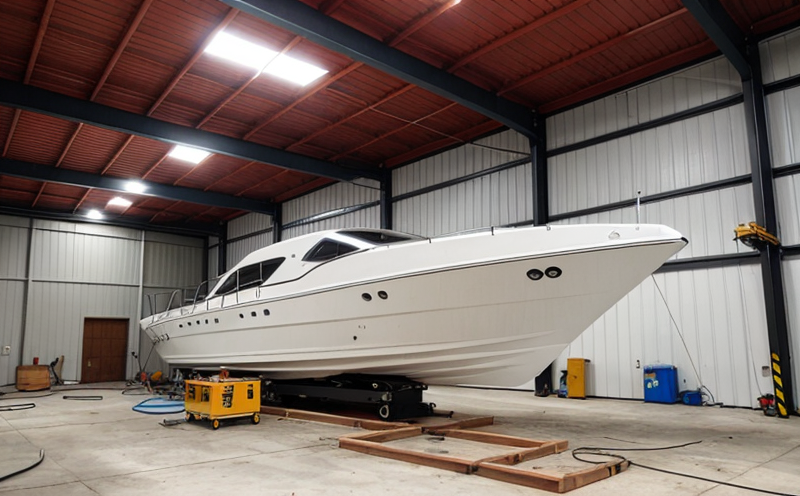ISO 14284 Sampling & Chemical Testing of Hull Materials
The ISO 14284 series addresses the need for standardized methods to ensure the integrity and reliability of marine hull materials. This service focuses on sampling and chemical testing, which are critical steps in verifying the quality and compliance of materials used in ship construction.
Sampling is a fundamental step that ensures representative material samples are obtained from various parts of the hull, including plating, bulkheads, and structural members. Proper sampling methods ensure accurate analysis and interpretation of results, contributing to the overall quality and safety standards of marine vessels.
The chemical testing aspect involves analyzing the composition of the hull materials for compliance with specified requirements. This includes assessing the presence of specific elements or compounds that could affect material performance, such as steel alloys used in shipbuilding. The process adheres strictly to ISO 14284-1 and -2 guidelines, ensuring precision and reliability.
The testing process begins with the selection of appropriate sampling sites on the hull. Factors influencing this decision include the type of material, its expected service life, and the intended function within the ship's structure. Once samples are collected, they undergo rigorous chemical analysis to identify key elements and compounds present in the materials used.
Understanding these parameters is crucial for ensuring that all materials meet the required specifications set forth by international standards like ISO 14284-1 and -2. Compliance with these standards guarantees consistent quality across different manufacturers and suppliers, enhancing the overall performance and safety of marine vessels.
The results from this testing play a vital role in ensuring that hull components can withstand harsh environmental conditions at sea while maintaining structural integrity over their operational lifetimes. This service provides valuable insights for quality managers, compliance officers, R&D engineers, and procurement teams involved in the design, manufacturing, and maintenance of marine equipment.
For instance, in shipbuilding projects, accurate testing helps identify potential issues early in the production process, allowing manufacturers to make necessary adjustments before full-scale production begins. This not only saves time but also ensures that each component meets stringent safety standards.
| Sampling Site | Description |
|---|---|
| Main Deck Plating | Critical for load distribution and weather protection |
| Bulkhead Plates | Seal compartments and prevent water ingress |
| Structural Members | Sustain the hull's integrity under stress conditions |
By adhering to ISO 14284 guidelines, this service ensures that all testing procedures are consistent with international best practices. This consistency is essential for maintaining high standards of quality and safety in marine equipment manufacturing.
| Chemical Analysis Parameters | Description |
|---|---|
| Carbon Content | Critical for strength-to-weight ratio |
| Silicon Content | Important for resistance to corrosion and wear |
| Manganese Content | Affects weldability and toughness of the material |
This service is particularly beneficial for companies involved in shipbuilding, offshore oil rigs, and other sectors where high-quality hull materials are essential. By leveraging ISO 14284 standards, we offer reliable testing services that contribute to the longevity and safety of marine vessels.
Industry Applications
- Shipbuilding: Ensuring hull materials meet strict quality and safety standards.
- Offshore Oil Rig Construction: Guaranteeing structural integrity of components used in offshore environments.
- Marine Transportation: Maintaining the reliability and durability of vessels to withstand harsh conditions.
- Research Institutions: Supporting scientific studies on material performance under marine conditions.
| Material Type | Description |
|---|---|
| Steel Alloys | Commonly used for their strength and corrosion resistance in marine environments. |
| Aluminum Composites | Offer lightweight properties but require careful handling due to high cost. |
The results from this testing are invaluable for various industries, helping manufacturers make informed decisions about material selection and production processes. This ensures that the final product not only meets regulatory requirements but also performs optimally in real-world conditions.
Why Choose This Test?
The ISO 14284 sampling and chemical testing of hull materials is essential for several reasons. Firstly, it provides a standardized approach to ensure that all samples are collected uniformly across different manufacturers and suppliers. This consistency enhances the reliability of test results, which is crucial for maintaining high standards in marine equipment manufacturing.
Secondly, this service allows companies involved in shipbuilding and offshore oil rig construction to meet stringent safety requirements set by international regulations. By adhering to ISO 14284 guidelines, manufacturers can demonstrate compliance with these standards, thereby gaining a competitive edge in the global market.
Thirdly, accurate testing helps identify potential issues early in the production process, allowing for necessary adjustments before full-scale production begins. This not only saves time but also ensures that each component meets stringent safety standards, enhancing the overall performance and longevity of marine vessels.
Furthermore, this service supports scientific studies conducted by research institutions, providing valuable data on material performance under marine conditions. The insights gained from these tests contribute to advancements in materials science and engineering, driving innovation in the industry.
International Acceptance and Recognition
The ISO 14284 series of standards is widely recognized and accepted by various international bodies involved in marine equipment manufacturing. These include organizations such as the American Bureau of Shipping (ABS), Lloyd's Register, and Det Norske Veritas (DNV).
By adhering to these standards, companies can ensure that their products meet global quality and safety requirements. This recognition enhances trust among clients and partners, fostering long-term relationships in the industry.
The international acceptance of ISO 14284 also facilitates trade between different countries, as it provides a common language for discussing product specifications and compliance. This standardization streamlines regulatory processes and reduces barriers to entry for manufacturers operating across multiple jurisdictions.





